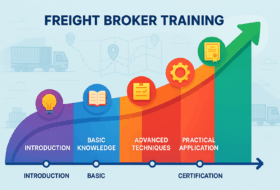Top 5 Skills Every Successful Freight Dispatcher Needs
In the dynamic world of logistics, freight dispatchers are the backbone of efficient transportation, connecting carriers with loads and ensuring smooth operations. Success in this role requires a unique blend of skills to manage drivers, negotiate rates, and handle unexpected challenges. Mastering these skills can boost efficiency, profitability, and career growth. Here are the five key skills every successful freight dispatcher needs.
The Role of Freight Dispatchers in Logistics
Freight dispatchers act as vital coordinators, working on behalf of carriers to secure profitable loads and manage delivery logistics. They communicate with shippers, brokers, and drivers, ensuring goods move seamlessly from point A to point B. With the U.S. trucking industry moving over 10 billion tons of freight annually, dispatchers play a critical role in keeping supply chains running smoothly.
Here are the top five skills that set successful freight dispatchers apart:
1. Exceptional Communication Skills
Effective communication is the cornerstone of freight dispatching. Dispatchers must clearly relay load details, delivery schedules, and special requirements to drivers while negotiating with brokers or shippers. Miscommunication can lead to missed deadlines or costly errors. Skilled dispatchers use concise, professional communication—whether via phone, email, or dispatch software—to build trust and ensure clarity. Practicing active listening and maintaining a calm tone during high-pressure situations can further enhance relationships with drivers and clients.
2. Organizational Mastery
Dispatchers juggle multiple tasks, from tracking shipments to scheduling loads and managing driver availability. Staying organized is essential to avoid oversights like double-booking or missed deadlines. Successful dispatchers use tools like Transportation Management Systems (TMS) or spreadsheets to track load statuses and driver schedules. Prioritizing tasks and maintaining detailed records can save hours and reduce errors, ensuring all shipments stay on track.
3. Problem-Solving Under Pressure
The freight industry is unpredictable, with challenges like traffic delays, mechanical issues, or last-minute load changes. Dispatchers must think on their feet to resolve issues quickly, such as rerouting drivers or finding replacement carriers. A dispatcher who can calmly assess options and make informed decisions—often under tight deadlines—can save carriers thousands in potential losses. Developing a proactive mindset and familiarity with backup plans, like secondary carrier contacts, is key.
4. Negotiation Expertise
Securing profitable loads requires strong negotiation skills. Dispatchers must advocate for carriers, balancing competitive rates with driver profitability. Understanding market trends, such as fuel costs or regional demand, allows dispatchers to negotiate rates that can increase carrier earnings by 10-20%. Building rapport with brokers and leveraging data from load boards like DAT or Truckstop enhances a dispatcher’s ability to secure better deals.
5. Time Management and Multitasking
Freight dispatching is fast-paced, with tight delivery windows and constant demands from drivers and clients. Successful dispatchers excel at managing their time, prioritizing urgent tasks like securing high-value loads while handling routine duties like paperwork. Using tools like automated scheduling software or setting daily priorities helps dispatchers stay efficient, reducing stress and ensuring no task falls through the cracks.
Challenges and Considerations
While these skills are critical, dispatchers must also navigate challenges like high-pressure environments and occasional miscommunications with drivers. Continuous learning through online courses, such as those offered by platforms like Freight Dispatcher Training, can help refine these skills. Additionally, staying updated on industry regulations, like Hours of Service rules, ensures compliance and enhances credibility.
How Dispatchers Can Develop These Skills
To build and strengthen these skills, freight dispatchers should:
- Practice Clear Communication: Take courses in professional communication or use role-playing to simulate driver interactions.
- Leverage Technology: Adopt TMS or load board tools to streamline organization and tracking.
- Learn Negotiation Tactics: Study market trends and practice negotiating through mock scenarios.
- Build Problem-Solving Experience: Shadow experienced dispatchers or join industry forums to learn real-world solutions.
The Road Ahead
As the logistics industry evolves, dispatchers with strong skills will remain in high demand. Emerging technologies, like AI-driven load matching and real-time tracking, are enhancing dispatching efficiency. By mastering these five skills, dispatchers can position themselves as invaluable assets, driving carrier success and thriving in a competitive market.
Conclusion
Freight dispatching is a rewarding yet demanding career that hinges on communication, organization, problem-solving, negotiation, and time management. By honing these skills, dispatchers can ensure smooth operations, maximize carrier profits, and build lasting industry relationships. As the freight sector grows, skilled dispatchers will continue to play a pivotal role in keeping America’s supply chains moving in 2025 and beyond.
FAQ
Q: Why are communication skills important for freight dispatchers?
A: Clear communication prevents errors, builds trust with drivers and clients, and ensures accurate load coordination.
Q: How can new dispatchers improve their skills?
A: Take online training courses, use dispatch software, and network with experienced dispatchers for mentorship.
Q: What tools help with organization in dispatching?
A: TMS platforms, load boards like DAT, and scheduling apps help dispatchers stay organized and efficient.
Enroll Today and join thousands of students who’ve turned their dreams into reality.
Growth + Change = Opportunity! How are you going to capitalize on the opportunity as a freight broker, agent, dispatcher or box truck carrier?
Enroll in a course today and get a Shippers List for free! Use Code: freeship





